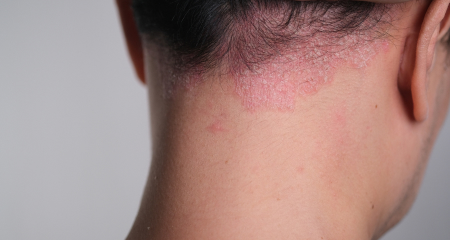
Psoriasis, with its red, itchy, and often painful plaques, can impact not only your physical well-being but also your self-confidence and peace of mind. If you’re looking for comprehensive care, the board-certified dermatologists at Northstar Dermatology in Colleyville are dedicated to offering compassionate expertise and customized treatment plans designed for your unique skin needs. Book an appointment online or call our office today to begin your journey toward relief.
Psoriasis is a chronic inflammatory skin condition characterized by an unusually rapid turnover of skin cells, resulting in thickened, red patches topped with silvery scales. This accelerated cell growth is driven by aberrant immune system signals, or “cytokines,” which send faulty messages to the skin. While the precise cause is still being studied, psoriasis is thought to stem from a combination of genetic and environmental triggers, such as infections or certain types of medications. Psoriasis can develop at any age and affects around 1-2% of people, but it is not contagious.
Psoriasis can appear in a range of different ways, from extensive redness covering large areas to tiny, pus-filled bumps on the hands and feet. Approximately 20-30% of people with psoriasis may also experience psoriatic arthritis, and the condition can affect both fingernails and toenails, often resembling toenail fungus.
Plaque Psoriasis (Psoriasis Vulgaris): Plaque psoriasis is the most common and typically develops on the scalp, elbows, knees, and gluteal cleft (upper buttocks area). The plaques may be itchy and may crack or bleed in severe cases.
Inverse Psoriasis: This variety targets skin folds, such as the armpits, navel, groin, and under the breasts. The plaques here are thinner and lack the usual scales due to higher moisture levels in these areas.
Guttate Psoriasis: Named for its raindrop appearance, guttate psoriasis presents as small plaques that may spread across the body. It often follows a strep infection.
Palmar-Plantar Psoriasis: Affecting the palms and soles, this type can be particularly debilitating, with plaques that may crack and cause severe discomfort.
Pustular Psoriasis: One of the rarest forms, pustular psoriasis is characterized by tiny pustules that often appear alongside symptoms like fever. Triggers include infections, certain medications, pregnancy, or the rapid reduction of corticosteroids. Variants include widespread types like von Zumbusch and localized breakouts like palmoplantar pustular psoriasis.
Erythrodermic Psoriasis: A full-scale medical emergency, erythrodermic psoriasis involves widespread inflammation across nearly the entire skin surface. It can cause significant fluid loss and potentially life-threatening cardiovascular complications.
Specific triggers vary by individual, but managing exposure to all or most of these potential activators may help reduce the likelihood of psoriasis.
Psoriasis treatment should be personalized and take into account the disease’s magnitude, a patient’s health history, immune function, any previous cancers, and medications being taken. That’s why, at Northstar Dermatology, we emphasize the importance of a comprehensive overview and physical exam to identify the most effective strategy.
Fortunately, a range of treatment options is available, with new, more pinpointed therapies emerging regularly.
Topical Treatments
Topical medications are the primary way most patients are treated. Corticosteroids in various strengths serve as powerful anti-inflammatory agents. Common topical steroids include hydrocortisone, desonide, triamcinolone, mometasone, betamethasone, and clobetasol. Additionally, vitamin D analogs like calcipotriene, retinoids like tazarotene, and steroid-sparing options such as tacrolimus, pimecrolimus, and topical roflumilast (Zoryve) provide complementary support.
Phototherapy
Phototherapy involves exposure to targeted wavelengths of ultraviolet light, specifically UVB or narrowband UVB, which can significantly reduce symptoms.
Systemic Medications
For mild to severe cases that do not respond to other treatments or when the condition is too widespread, oral or injectable medications may be used. Oral options include cyclosporine, methotrexate, and Otezla. Biologic medications, a.k.a. large-molecule drugs delivered by injection, are highly effective in targeting specific immune responses. Examples include infliximab (Remicade), etanercept (Enbrel), adalimumab (Humira), certolizumab (Cimzia), secukinumab (Cosentyx), ixekizumab (Taltz), guselkumab (Tremfya), tildrakizumab (Ilumya), risankizumab (Skyrizi), and ustekinumab (Stelara), among others. While these medications are safe for most patients, they do require periodic lab tests and follow-ups because they affect how the immune system functions.
For a treatment plan tailored to your specific needs, contact us today by phone or fill out our online form.
